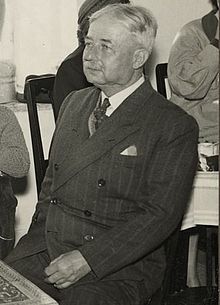John Bagot Glubb
Sir John Bagot Glubb , alias Glubb Pascha (born April 16, 1897 in Preston , Lancashire , England ; † March 17, 1986 Mayfield, East Sussex ) was a British officer, military strategist and Middle East expert. He was best known for his work in the context of the exercise of mandates in Great Britain via Transjordan and then in independent Jordan . He was responsible for establishing and running the Arab Legion , the most efficient Arab military unit of its time.
Life
John Bagot Glubb was the son of an officer in the British Army . He received training at the prestigious Cheltenham College and attended the Royal Military Academy . After serving in World War I , Glubb voluntarily went to Iraq in 1920 , where he lived among Bedouins and studied their language and culture. From 1926 to 1930 he was administrative inspector for the Iraqi government.
Glubb and the Arab Legion
He was then sent to Transjordan and assigned to the Arab Legion , which was emerging there . In 1930 he formed the (camel) mounted Desert Mobile Force . Its members consisted exclusively of Bedouins with experience in the desert . Within a few years his endeavors had convinced them to give up their previous raids and raids.
From 1939 he led the army of the future king and his friend Abdallah I with the rank of general with the help of other English officers. This so-called Arab Legion fought successfully on the side of the Allies in Iraq in 1941 to overthrow a group of Nazi-friendly putschists . He also fought with his troops in the mandated areas of Syria and Lebanon held by Vichy France . In the Palestine War of 1948, the Legion was the only successful Arab army. They occupied the Arab-settled West Bank , which was subsequently annexed by Jordan .
Growing anti-British opposition within the country forced Glubb's dismissal in March 1956 as a result of the conflict over the Suez crisis . After the repeal of the military pact with Great Britain in 1948, the last British troops withdrew from Jordan on July 2, 1957, after the latter had already gained full sovereignty with the new regulations on troop stationing on March 15, 1948.
Glubb eventually retired from the British Army with the rank of lieutenant general .
family
Glubb was married and had a biological son and two adopted sons and an adopted daughter. The adopted children were Arab war orphans. Glubbs son Faris (1939-2004) became known as an author and historian on the subject of Palestine under the name Faris Yahya .
death
Sir John died in 1986 at his home in Mayfield, East Sussex. He is buried there in the village cemetery at St. Dunstan's Church.
Awards
- 1925 Officer of the Order of the British Empire (OBE)
- 1946 Companion of the Order of St Michael and St George (CMG)
- 1956 Knight Commander of the Order of the Bath (KCB)
literature
- John B. Glubb Pasha: Beyond the Jordan. Soldier with the Arabs. Paul List, Munich 1958.
- John Bagot Glubb: Britain and the Arabs. A study of fifty years. 1908 to 1958. Hodder and Stoughton, London 1959.
- John B. Glubb: The Arab Empire. Between Mecca and Granada 680–860. Gerhard Stalling, Oldenburg et al. 1964.
- James Lunt: Glubb Pasha. A biography. Lieutenant-General Sir John Bagot Glubb, commander of the Arab Legion 1939–1956. Harvill, London 1984, ISBN 0-00-272638-6 .
- Benny Morris: The Road to Jerusalem. Glubb Pasha, Palestine and the Jews (= Library of Middle East History. Vol. 1). Tauris, London et al. 2003, ISBN 1-86064-812-6 .
Web links
- Literature by and about John Bagot Glubb in the catalog of the German National Library
- Encyclopedia Britannica, engl
- 1956 - King of Jordan sacks British general BBC article and video engl.
- Columbia Electronic Encyclopedia, engl.
- Encyclopedia of the Orient, engl. with picture
Individual evidence
- ↑ Al-Massad Joseph : Colonial Effects. The Making of National Jordan. Columbia University Press, New York NY et al. 2001, ISBN 0-231-12322-1 , p. 126 ff.
| personal data | |
|---|---|
| SURNAME | Glubb, John Bagot |
| ALTERNATIVE NAMES | Glubb Pasha |
| BRIEF DESCRIPTION | British officer, military strategist and Middle East expert |
| DATE OF BIRTH | April 16, 1897 |
| PLACE OF BIRTH | Preston, Lancashire , England |
| DATE OF DEATH | March 17, 1986 |
| Place of death | Mayfield, East Sussex |
